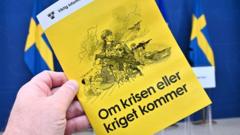In light of escalating global tensions, including Russia's invasion of Ukraine, Nordic nations are taking proactive measures to ensure citizens are prepared for various crises, distributing new pamphlets that outline survival strategies.
Nordic Nations Emphasize Crisis Preparedness Amid Rising Tensions

Nordic Nations Emphasize Crisis Preparedness Amid Rising Tensions
Sweden, Finland, and Norway release updated guides to help citizens prepare for potential conflicts and extreme events.
Sweden's updated pamphlet, "If the crisis or war comes," is hitting mailboxes this Monday, reflecting an increased focus on crisis preparedness due to the evolving security landscape in Europe. This update, the first in six years, expands on previous versions and incorporates lessons gleaned from Russia’s aggressive actions in Ukraine.
Neighboring Finland has also joined the effort, opting for a digital approach with its newly published advice on crisis management, which emphasizes the government's readiness to respond to military threats. Unlike Sweden, which will distribute physical copies, Finland's decision to go digital is meant to reduce costs and facilitate quicker updates.
Norway adds to the mix, having recently sent out its own pamphlet encouraging readiness for a week without external assistance in the face of severe weather, armed conflict, or other crises. This includes practical items like non-perishable food and medications, with a strong focus on self-preparedness. Tore Kamfjord of Norway’s Directorate for Civil Protection noted that climate change and increase in extreme weather have necessitated this emphasis on individual readiness.
Historically, Sweden has produced such materials since World War Two, with its earliest version of “If War Comes” emerging during that conflict, followed by updates during the Cold War. Minister Carl-Oskar Bohlin stated that the current geopolitical climate necessitates providing updated information to Swedish households to help them understand the realities of potential conflict. A notable shift in the messaging is the proclamation that Sweden will not surrender should it be attacked.
The guides feature instructions for various scenarios to ensure citizens can independently manage the initial phases of a crisis. For instance, Finns are being asked how they would cope without power during harsh winter conditions, while the Swedish pamphlet advises keeping enough food and water to last for at least 72 hours.
As citizens across these nations receive this crucial information, opinions vary on just how prepared they feel. While some express confidence in the guidelines, concerns remain about the practicality of these recommendations for families living in smaller homes. With the backdrop of the ongoing war in Ukraine and rising security threats, the importance of these preparedness initiatives has never been felt more acutely in the Nordic region.
Neighboring Finland has also joined the effort, opting for a digital approach with its newly published advice on crisis management, which emphasizes the government's readiness to respond to military threats. Unlike Sweden, which will distribute physical copies, Finland's decision to go digital is meant to reduce costs and facilitate quicker updates.
Norway adds to the mix, having recently sent out its own pamphlet encouraging readiness for a week without external assistance in the face of severe weather, armed conflict, or other crises. This includes practical items like non-perishable food and medications, with a strong focus on self-preparedness. Tore Kamfjord of Norway’s Directorate for Civil Protection noted that climate change and increase in extreme weather have necessitated this emphasis on individual readiness.
Historically, Sweden has produced such materials since World War Two, with its earliest version of “If War Comes” emerging during that conflict, followed by updates during the Cold War. Minister Carl-Oskar Bohlin stated that the current geopolitical climate necessitates providing updated information to Swedish households to help them understand the realities of potential conflict. A notable shift in the messaging is the proclamation that Sweden will not surrender should it be attacked.
The guides feature instructions for various scenarios to ensure citizens can independently manage the initial phases of a crisis. For instance, Finns are being asked how they would cope without power during harsh winter conditions, while the Swedish pamphlet advises keeping enough food and water to last for at least 72 hours.
As citizens across these nations receive this crucial information, opinions vary on just how prepared they feel. While some express confidence in the guidelines, concerns remain about the practicality of these recommendations for families living in smaller homes. With the backdrop of the ongoing war in Ukraine and rising security threats, the importance of these preparedness initiatives has never been felt more acutely in the Nordic region.























